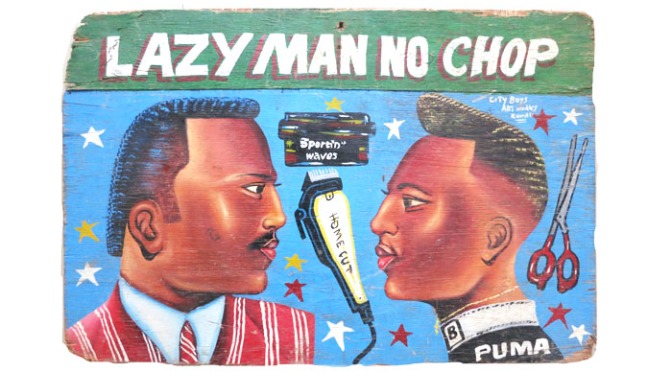Published 1 February 2013 – The Mirror, Ghana
We walk past hairdresser signboards so often in Ghana, that we never really stop to notice. But art galleries all over the world are taking a growing interest in what is fast becoming a celebrated artform.
Right now at museums in the UK, US and Europe, hand-painted hairdresser and barbershop signboards are selling for thousands of dollars. From the Museum for African Art in New York to the Museum of African Art in Belgrade, Serbia, prestigious museums are organizing whole exhibitions of hairdresser and barbershop signs from Ghana, Togo, Benin and Cote d’Ivoire.
Even a recently published book called ‘Joe’s Hair That Talks: The Vibrant Sign Culture of Ghana’ includes photos of outstanding barber and hairdresser signs. However at home in Ghana, little appreciation is paid to these signs as a form of art.
Dr Doran Ross is one of the academics trying to change this perception. As Director Emeritus of the Fowler Museum at University of California, Los Angeles, he has been studying and collecting the signpainters of Ghana for nearly forty years.
With their skillful hand-painting and creativity in style and form, he says the signs are a stunning example of African artistic culture; “Galleries and audiences are interested in African handpainted signs because they are wonderfully creative works of art,” he says.
Why then, do the signs receive little attention in Ghana? “Most people around the world do not fully appreciate the artistic signage they drive by on a daily basis,” he suggests. “We generally have other things on our minds and often need to have the day to day arts pointed out to us by someone else.”
It is not only the stylistic artistry which interests academics like Ross; Hair and hairdressing are undeniably an important part of Ghanaian culture. Many academics this is because hair, especially grooming and braiding, is a platform for Ghanaian discussions about identity, race and nationhood. Hairdresser signboards are a tangible example of this, says Ross.
For example, some expose our interest in American culture, with business titles like ‘Poet USA Haircut’ or ‘America Salon’. In the 50’s and 60’s many signboards presented paintings of American celebrities such as Muhammad Ali or James Brown. Today they include more modern stars such as Rihanna or Beyonce. “This is a comment on numerous glabalizing phenomena, including issues related to celebrity, fashion, music and technology,” says Ross.
Even the titles of hairdresser businesses are creative, with many using humour or personal stories. Some of Ross’s favourites are ‘Depend on Jesus Haircut’, ‘Eye Hustler Man No Peace Hair’ and ‘Death Row Changes Unisex Salon’.
So next time you are walking past a hairdresser sign, make sure to have a closer look. You might just be looking at the next big artist.


